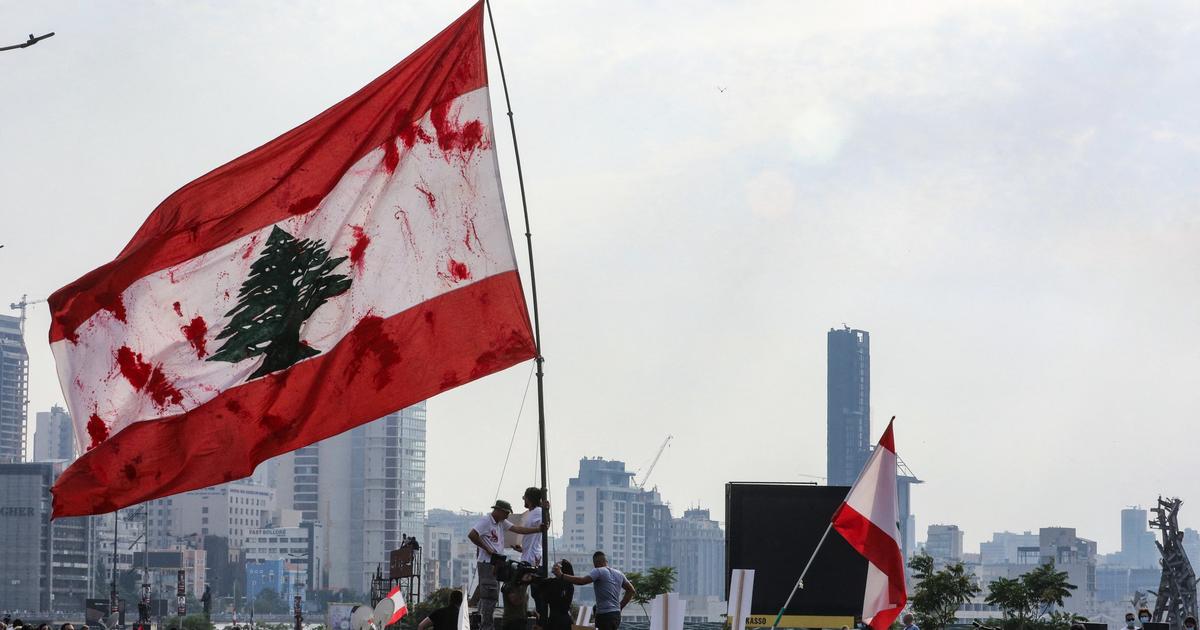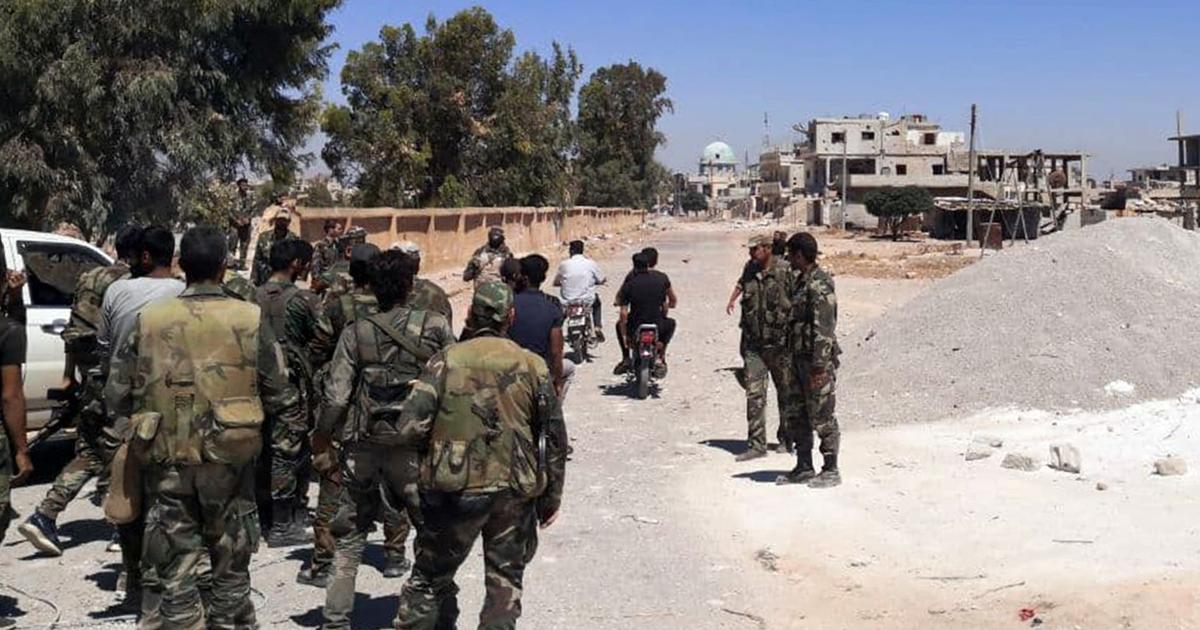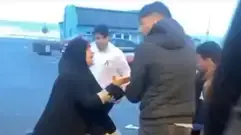Ever since he fell on the construction site and injured his back - he was fired from his job for it - Muhammed's life has been spent within the four walls of his dilapidated grocery store, from six in the morning until ten at night, when he closes the blind and goes home.
"Believe me when I tell you that I don't really know what's two streets away."
It is not only the injury that moves him to lead a life behind closed doors, it is also the invisible borders;
red lines marked by growing social tension and, increasingly, by an Administration determined to turn the screw on the Syrian issue.
Because Muhammed (who has asked not to use his real name) is Syrian, he fled Aleppo with his family in 2015 ―when the Bashar al-Assad regime was fighting for the city,
rebels and jihadist groups – and reside in a neighborhood of Istanbul that is increasingly hostile to refugees.
The Government, faced with the growing tension, forces the transfer of hosts, prohibits them from settling in a part of the country and presses for them to return to Syria.
The neighborhood is nondescript in a succession of similar ones, a sprawling cement forest of cheap buildings and worn-out lives that feed into the nearby Ikitelli industrial estate.
The main street, animated by the hustle and bustle of returning home after a day's work, is full of small businesses whose lights identify bakeries, butchers, shoe stores, businesses in Turkish and for Turkish people.
Two blocks away, where Muhammed barely leaves, the street is narrower and darker after dark, the shops are mostly signed in Arabic, and the customers are almost exclusively Syrian.
Over the years and the lack of expectations that the Syrians will return to their country, the feeling of the Turks towards the refugees (3.6 million people) has gone from the compassion with which they were received at the beginning of the war rejection: "They don't integrate", "they have many children", "they are dirty", "they take away our jobs", "our soldiers die in Syria while they enjoy aid from the State", "they are violent", "they kidnap to children in the parks” (all these phrases have been heard by this journalist from the mouths of Turks).
"A large part of the Turkish population hates Syrians without having met any, only because of what the media say that reproduces speeches by racist politicians," explains Taha Elgazi, a refugee rights activist.
In working-class neighborhoods like Ikitelli, Turks and Syrians live door to door with little interaction.
And, little by little, the barrier of mutual ignorance has ended up becoming a barrier of rejection, as the economic crisis of recent years - with crazy inflation figures of up to 85% - has increased the brutal competition for employment , and with it the friction.
"They blame us for everything, for the rise in rents, for inflation, for anything bad that happens in the neighborhood," Muhammed complains.
Three years ago, a false rumor spread that a Syrian had harassed a Turkish girl and hundreds of neighbors robbed businesses and stoned homes in Ikitelli.
Muhammed closed the grocery store and locked himself in the house with his family for two days, scared of what might happen to them.
Since then,
The most serious attack occurred last year in the Altindag district of Ankara, when, after a young Turkish man was stabbed by a Syrian during a fight, an orgy of violence was unleashed against hundreds of homes where Syrians lived.
The opposition has smelled blood on this issue for a long time and, whether from the center-left or the right, has launched itself to spur anti-immigration sentiment in the most populist way, criticizes Elgazi.
This presents a serious problem for the government of Recep Tayyip Erdogan, since many of these working-class neighborhoods are home to their large voting grounds, so the Ministry of the Interior has got down to work and has approved a policy to try to "dilute ” the foreign population in the Turkish majority.
Nearly 1,400 neighborhoods in 64 provinces have been declared “closed”, that is, foreigners of any nationality are prohibited from residing in them unless they were registered before the measure or purchased a home there.
Refugees (Syrians, and to a lesser extent Iraqis and Afghans) are also prohibited from settling in 23 entire provinces.
Among them are those of the main cities (Istanbul, Ankara, Izmir and Bursa), certain border areas or provinces with certain political significance;
for example, those from which the leaders of the governing coalition come.
In total, more than a third of the country's territory.
The problem is that the provinces that remain open are not precisely the ones that offer the most opportunities to survive.
“Many Syrians tend to gravitate towards the bigger cities, where they have more opportunities to work.
To leave the province in which they are registered, refugees need a special permit, so if they are found without it and outside the province in which they have official residence they can be detained,” explains Emma Sinclair of Human Rights Watch. (HRW).
If the agent takes pity on the refugee, they will simply force them back to the province of registration – where they usually have no roots – but if they are unlucky, they may end up in a detention center and be deported back to Syria.
It has happened to hundreds, according to HRW reports.
There are other more subtle measures.
Four months ago tens of thousands of records of foreigners disappeared from the system, although the Migration Management Directorate assured that it could be solved by making a new appointment with the Administration, Elgazi assures that "many have had problems renewing their address of residence and they have lost their registration”, with the danger that this will turn them into undocumented migrants.
“In April, there were 1,309,394 foreigners in Istanbul and, since then, despite the arrival of Russians and Ukrainians, the figure has dropped to 1,271,279.
That is to say, the restrictions are working”, congratulated the Minister of the Interior, Süleyman Soylu, in October, who has ordered to multiply the raids in search of undocumented migrants and foreign offenders.
Turn invisible
The Ministry of the Interior has also proposed to reduce the number of foreigners in neighborhoods where they make up more than 20% of the population.
Of those in the Altindag district, where a
pogrom
took place last year, more than 4,500 Syrians have been expelled to other places, 177 businesses they owned have been closed and dozens of abandoned houses where the refugees were demolished. poor.
“Pilot projects like this have been started in Altindag and some districts in [southeastern] Gaziantep province, but they raise more questions than answers: who is going to decide who goes and who stays? work or business of the Syrians?” asks the Syrian academic Omar Kadkoy, of the
think-tank
Turkish TEPAV, which sees similarities with certain policies of the twenties and thirties of the last century, when the Government of the nascent Republic of Turkey ordered forced transfers between provinces of the population of languages other than Turkish or religion other than Sunni Islam so that they could assimilate the mayority.
That is the prevailing sentiment among Syrians: that to stay in Turkey they must make themselves invisible.
"If you walk down the street you can't laugh or speak loudly in your language, nor have a picnic in a park in front of a Turk," Muhammed complains.
It might seem like an exaggeration, but it is not.
In the province of Bolu, after the mayor ―of the opposition party CHP― campaigned against foreigners and forced them to pay the water bill and a waste tax ten times the usual price, the governor ―dependent on the Executive central― brought together representatives of immigrants and transmitted to them a series of behavioral guidelines, among them, that they should not gather in groups in public spaces,
“Unfortunately, there is a lot of political tension in Turkey, due to the economic crisis and as we get closer to the elections.
Turkey has been very generous in its hosting of Syrians fleeing the war and the Turkish government used to be very supportive of refugees, but now we see a change in policy, and obviously these new restrictions are greeted with fear and concern by those affected." explains Haya Atassi, from the Syrian Association for Citizen Dignity (SACD).
Many interviewees see part of this social and administrative pressure as a way to force Syrians to return to their country, but Atassi considers that neither the areas under the control of Turkey and its allies in the border area, nor those under the regime of Assad or other actors offer sufficient security guarantees.
“Erdogan has a goal of one million Syrians returning voluntarily.
But how can we talk about voluntary return when it is done through pressure, erasing your record, detaining you and forcing you to sign deportation papers by force?” criticizes Elgazi.
The solution, for some, lies precisely in the other direction.
Outside Muhammed's shop, a young man waits anxiously for an hour until a friend shows up.
They go in and start shopping: two orange sodas, two waters, two cans of tuna, two cans of canned meat.
“Tonight we are going to Europe.
We have had enough of being slaves”, maintains the first.
“I've been asking for the papers for years and they haven't given them to me, so I'm afraid they'll arrest me in a raid and deport me to Syria.
Better try your luck in Europe, where at least they treat you like a person.
Here, before being a human being, you are a Syrian, there is a lot of racism”.
The two young people say goodbye and get lost in the darkness outside.
Heading for the border with Greece.
Follow all the international information on
and
, or in
our weekly newsletter
.
Subscribe to continue reading
read without limits
Keep reading
I'm already a subscriber

/cloudfront-eu-central-1.images.arcpublishing.com/prisa/36OK2SY5SEK57QE4VYL4T4PMVY.jpg)







